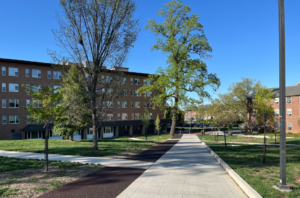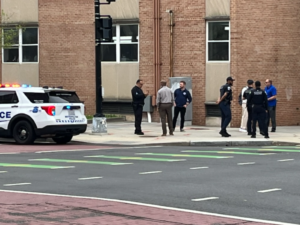President Garvey Reviews: Playing through the Whistle by S.L. Price Hillbilly Elegy by J.D. Vance
On the last Friday of each month University President John Garvey reviews a piece of art for The Tower.
Aliquippa, an old industrial town in Southwestern Pennsylvania, has historically produced two things: Steel and great football players. Since 2008, the Aliquippa High School football team has gone to the Western Pennsylvania Interscholastic Athletic League (WPIAL) title game each year. Fabled football players like Mike Ditka, former coach of the Chicago Bears; Ty Law, three-time Super Bowl champion; and New York Jets cornerback Darrelle Revis all played for Aliquippa. Aliquippa has other notable alums, like Oscar winning composer Henry Mancini, who wrote the theme music for The Pink Panther and “Moon River,” for Breakfast at Tiffany’s.
In Playing through the Whistle, S.L. Price chronicles the fortunes of both the high school football team and the little town in which it was forged. Aliquippa grew up around Jones and Laughlin Steel Company. The inhabitants came from Eastern Europe, Germany, and Italy. African Americans came from the Deep South. They all came for the promise of work. The first J&L furnace was fired up on December 1, 1909. Football followed just a few years later. What was then called Woodlawn High fielded its first football team in 1914. Two-thirds of the boys, the high school yearbook reported, had never played football before. In 1952 the Quips won their first WPIAL title.
What made Aliquippa football great? Price observes that game requires the same strength and toughness forged in the mills. “Both depend on collective striving on ‘the line’ and its meld of various skill sets . . . Both depend on—even celebrate—the implicit trade of health for money.”
But football also provided a way out of that life. Mike Ditka, for example, knew he never wanted to work for J&L after touring the mill in high school. Football offered an alternative. It offered the chance of a scholarship, a college education, and maybe a shot at the NFL.
When J&L began shutting down furnaces and cutting jobs in the 1980s, football became the only alternative to the streets. J&L had served as a “vocational safety net.” People without a college or even high school degree could find work that paid them enough to support a family—and gave them a sense of dignity. When the mill shut down, drugs and crime filled the vacuum it left.
In his memoir Hillbilly Elegy, J.D. Vance offers another perspective of life in the Rustbelt. Vance grew up in Middletown, Ohio, an old steel mill town like Aliquippa. He saw firsthand the decline of the industrial Midwest and acknowledges the problem of economic insecurity for the working poor. But Vance also saw in his family and his community a lack of agency, “a feeling that you have little control over your life and a willingness to blame everyone but yourself.”
Vance’s family and his white working poor community were not just financially poor. They lacked social capital, the network of people and institutions that ensure we have opportunities and teach us valuable lessons.
Vance’s family, for example, imparted important values like loyalty and love of family. But Vance had few examples of good marriages and healthy conflict resolution. Vance’s grandmother “Mamaw,” once doused his grandfather “Papaw” with gasoline and lit him on fire while he slept because he came home drunk. His father gave him up for adoption when he was in kindergarten and his mother brought a revolving door of father figures into his life. Vance heard lots of talk about hard work in Middletown but saw few examples of a strong work ethic—thirty percent of the young men work less than twenty hours a week.
Vance did get out of Middletown, not on a football scholarship, but by joining the Marines. He then went to college and then to law school at Yale. In Hillbilly Elegy Vance identifies the factors that made his success possible. There was the Christian faith he learned from his Mamaw and later his father that taught him to never despair, because God has a plan. Above all, there were Mamaw and Papaw themselves who provided Vance a stable adult presence in his life and instilled in him hope for his future.
Playing Through the Whistle describes the impersonal economic and political forces that have shaped Aliquippa and are now leading to its decline. Hillbilly Elegy focuses on the personal choices that lead to success or failure. I think they are two sides to the same coin. I grew up in an old steel town about an hour north of Aliquippa. Sharon’s football team plays in the same conference as Aliquippa. I saw how hard it is to get ahead in a town with no industry. That’s why my siblings and I all left. But I also know that we were able to leave because we had the support of our large and loving family. If we want to help the working poor, we need to look for ways to improve both economic and cultural conditions.








